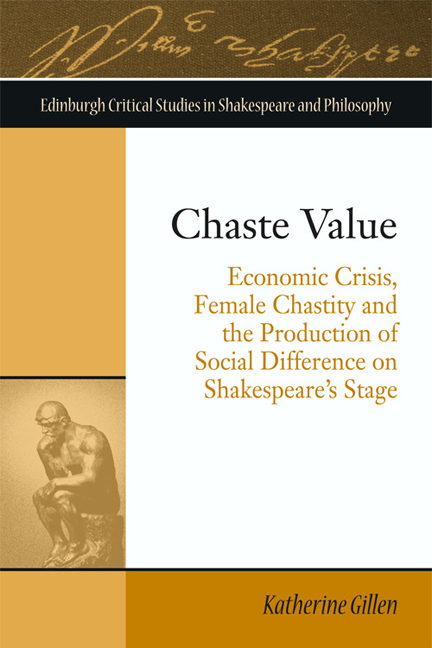 Chaste Value
Chaste Value Book contents
- Frontmatter
- Contents
- Acknowledgements
- Series Editor's Preface
- Introduction: Chastity and the Question of Value
- 1 Chastity and the Ethics of Commercial Theatre in Measure for Measure, Pericles and The Revenger's Tragedy
- 2 Commercial Chastity and Aristocratic Value in Troilus and Cressida, The White Devil and The Changeling
- 3 Chaste Selfhood: Ben Jonson's Critique of Urban Chastity Tropes
- 4 Chastity and Blackness: Racial Value and Commodity Potential in The Fair Maid of the West, Part I and Othello
- 5 Mediterranean Markets, Commoditised Masculinity and the Whitening of Christian Chastity in The Merchant of Venice and The Renegado
- 6 Chaste Treasure and National Identity in The Rape of Lucrece and Cymbeline
- Coda: Approaching Capitalist Modernity
- Index
5 - Mediterranean Markets, Commoditised Masculinity and the Whitening of Christian Chastity in The Merchant of Venice and The Renegado
Published online by Cambridge University Press: 22 December 2017
- Frontmatter
- Contents
- Acknowledgements
- Series Editor's Preface
- Introduction: Chastity and the Question of Value
- 1 Chastity and the Ethics of Commercial Theatre in Measure for Measure, Pericles and The Revenger's Tragedy
- 2 Commercial Chastity and Aristocratic Value in Troilus and Cressida, The White Devil and The Changeling
- 3 Chaste Selfhood: Ben Jonson's Critique of Urban Chastity Tropes
- 4 Chastity and Blackness: Racial Value and Commodity Potential in The Fair Maid of the West, Part I and Othello
- 5 Mediterranean Markets, Commoditised Masculinity and the Whitening of Christian Chastity in The Merchant of Venice and The Renegado
- 6 Chaste Treasure and National Identity in The Rape of Lucrece and Cymbeline
- Coda: Approaching Capitalist Modernity
- Index
Summary
English plays and travel tracts evince anxiety that participation in overseas trade, especially with the East, may expose Western Christians to objectifying commoditisation. The expansion of Mediterranean trade following the founding of the Levant Company in 1581 allowed merchants to more easily exchange English cloth and other goods for luxury items such as cotton, wine, silk and spices attained in ports throughout Italy, Greece, Turkey, Persia, Africa and the East Indies. Travel and trade not only brought the English into contact with other cultures but also introduced them to competing regimes of value, defined by Arjun Appadurai as cultural categories determining exchange potential. Intercultural exchange, as Appadurai explains, provides ‘contexts for the commoditization of things that are otherwise protected from commoditization’. The commodity potential of Western bodies, sexuality and sacred items in particular becomes vividly apparent in the intensely commercial, multicultural contexts of Mediterranean trade. English concern with personal commoditisation in the Mediterranean centres on the institutions of slavery and the harem, often with the effect of displacing antisocial commoditising impulses onto Easterners despite England's own investment in pursuing profits in expanding markets. The early modern theatre mediates these concerns, and its embodied mode of representation heightens the travel tracts’ focus on the commoditising subjugation of Eastern captivity and the attendant fungibility of identity in multicultural commercial environments.
In recounting the horrors of captivity, English travel writers depict slavery as a sign of Easterners’ inappropriate willingness to commoditise people and as a threat to the personal and cultural integrity of Westerners. In his Relation of a Journey, George Sandys registers disgust at slave markets where Christians are ‘sold as horses in Faires; the men being rated according to their faculties, or personal abilities; as the women for their youths and beauties’. John Rawlins similarly emphasises the treatment of people as chattel as he recounts his own experience of slavery in Algiers in The Famous and Wonderful Recovery of a Ship of Bristol, relating that ‘many came to behold us, sometimes feeling our brawns and naked arms, and so beholding our prices written in our breasts, they bargained for us accordingly, and at last we were all sold’.
- Type
- Chapter
- Information
- Chaste ValueEconomic Crisis, Female Chastity and the Production of Social Difference on Shakespeare's Stage, pp. 205 - 253Publisher: Edinburgh University PressPrint publication year: 2017


